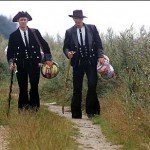Last night, I was sitting at the kitchen table, desperately hoping to resuscitate a beloved gadget that had crapped out on me, when the downstairs buzzer rang. I answered:
“Hallo?”
“Süß oder saures!” cried a million high-pitched voices.
“Was?” I asked, mystified.
“Süß oder saures!” they sang again.
I remained at the buzzer, puzzled, and unable to comprehend what they were saying, until the resident in the flat above answered with, “Mmh, okay, dann, ganz nach oben.”
And then it hit me: Trick-or-Treat! I was so taken aback, I just sat down at my computer and listened as they shuffled up the stairs. They eventually rang at our front door. I considered not answering; but this plan was dashed when Pierre came out of his room and opened the door. They again screamed “süß oder saures!” and I heard him say, “Ah, ehm, okay. Uh, ein moment.” Then he came into the kitchen and asked if we had any chocolate. I was about to throw a shoe at him, but luckily I remembered the fun-sized butterfinger I had just brought back from the states for my flatmates. I tore into my suitcases looking for them, and ran out to see five little rugrats dressed up in costume. They looked rather askance at the candy I was throwing in their bags, but I think they’ll have fun when it comes to rummaging their loot.
For those of you who are wondering how this all started, the answer is: no, it was not a conspiracy cooked up by the supermarkets to mass-produce/consume candies. Actually, it was originally called All Hallows’ Eve, which comes just before All Saints’ Day, the night when spooks are said to come out and walk the earth. The idea was that everyday citizens would dress up as witches and warlocks, ghouls and goblins, and walk the streets, hoping to trick the evil spirits and stay safe. And then, no holiday is complete without chocolate (Hear, hear!)…
Halloween was such a great adventure when I was young. We lived in a condominium complex where many small apartments were squashed together in diversely aligned rows, which provided the most maximally efficient trick-or-treating route. We would bring pillow cases with us that would quickly fill to the brim after just an hour of skipping from house to house. And at the end of the night, my sister and brother and I would spread out our loot in three large piles, carefully take stock and categorize the goods, making faces along the way at those who threw in toothbrushes in lieu of chocolate, before commencing barter for the candy we liked. At the end of the evening, Mom would make us store our candy in large jars above the fridge, and only allowed us a few pieces each day or so. As the weeks passed, and the jars slowly emptied, the bartering became even more of a challenge, as we’d try to save the good pieces and trade them off for several not-so-good pieces (a monster chocolate coin might be worth three tootsie rolls, for example).
It is incredibly striking, when I think back on it, how our country could have developed such a tradition on such a massive scale. After all, in order for it to continue, it requires the participation of everyone in the country, and they do! Sure, there is the occasional sour puss who turns off all the lights in their home, or the paranoia over poisoned bon-bons, or sadly, the one-off crazies who open fire at little boys, but for the most part, it is a fun, safe, family event.
In Europe, you can of course find Karneval or this bizarre Swedish tradition where girls dress up as witches and go begging for candy (boys not allowed)… The difference is that these events are usually organized either by people who know each other, or by local businesses. You would never have strangers randomly show up at your doorstep all evening demanding candy.
I have a feeling that this is the true reason why Halloween has failed to take off in Europe. They certainly try — every year. But it takes a lot to convince people that they should let random strangers invade their personal space (homes) and that they should reward them with chocolate to do so.






